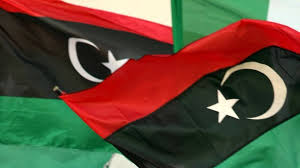By Mark Baber
August 25 – Libyan politician Fayez Mustafa al-Sarraj, whose official titles include Chairman of the Presidential Council of Libya and prime minister of the Government of National Accord of Libya, has made a visit to Tripoli’s Al-Ahli football club on calling for an end to the “ban” on international matches in Libyan stadiums.
According to an article in the English language Libyan Herald, Sarraj told club officials that he was working to “end the ban on international matches being played in Libyan stadiums.” Photos of the visit show Serraj wearing the green Al-Ahli scarf as he toured the stadium, watched a training session and posed with players.
That Serraj would take time off from his usual meetings with European leaders, from whom he solicits funds and military support with the promise of halting the flow of refugees to European shores, is an indicator of the symbolic value of football in representing national unity, and also perhaps a recognition of the traditional role of a ruler as a guarantor of “bread and circuses” for the masses.
Unfortunately for Serraj, his position as Prime Minister of Libya is challenged by two other putative governments – and his effective rule by numerous armed militia. The recent week-long kidnapping of ex-PM Ali Zeidan who was invited to Libya by Serraj who organised his security and booked the hotel in Tripoli from which he was grabbed, provides a salutary lesson for any national federation thinking of sending their national team players to the Libyan capital.
Ali Zeidan was reportedly kidnapped by the Tripoli Revolutionary Brigade, a group ostensibly loyal to Serraj.
According to the Herald, Serraj’s visit to Al Alhi was criticised on social media where people asked why he “had time to watch the football team’s training while people in Tripoli have had to endure misery with water and power shortages, lack of money in the banks and soaring prices.”
In recent weeks Tripoli has struggled to live without electricity for 14-20 hours a day and residents recently endured six whole days without any water, on top of kidnappings and chronic insecurity.
In more positive developments, the Libyan national men’s team has recently qualified for the CHAN 2018 after a win and a draw against Algeria (where the “home” fixture was played in Tunisia). In addition, the Algerian Football Federation has reportedly made positive noises about holding a friendly with spectators in Tripoli.
The Libyan Premier League has recently restarted after a two year hiatus, albeit without spectators at the grounds. Indeed the Libyan Football Federation has, earlier this week, put the broadcast rights for the 2017/18 season up for sale for LYD 1 million (£578,000).
On the other hand, the Libyan side withdrew from a U-20 Women’s World Cup qualifier they were due to host in late July, giving the Sierra Leone side a walk-over. The circumstances of the withdrawal are unclear, but women’s football has been specifically condemned by some of the military factions enabled by the 2011 intervention and Libyan women have been banned from travelling abroad without both security clearance and a male guardian.
Contact the writer of this story at moc.l1713615540labto1713615540ofdlr1713615540owedi1713615540sni@r1713615540ebab.1713615540kram1713615540

